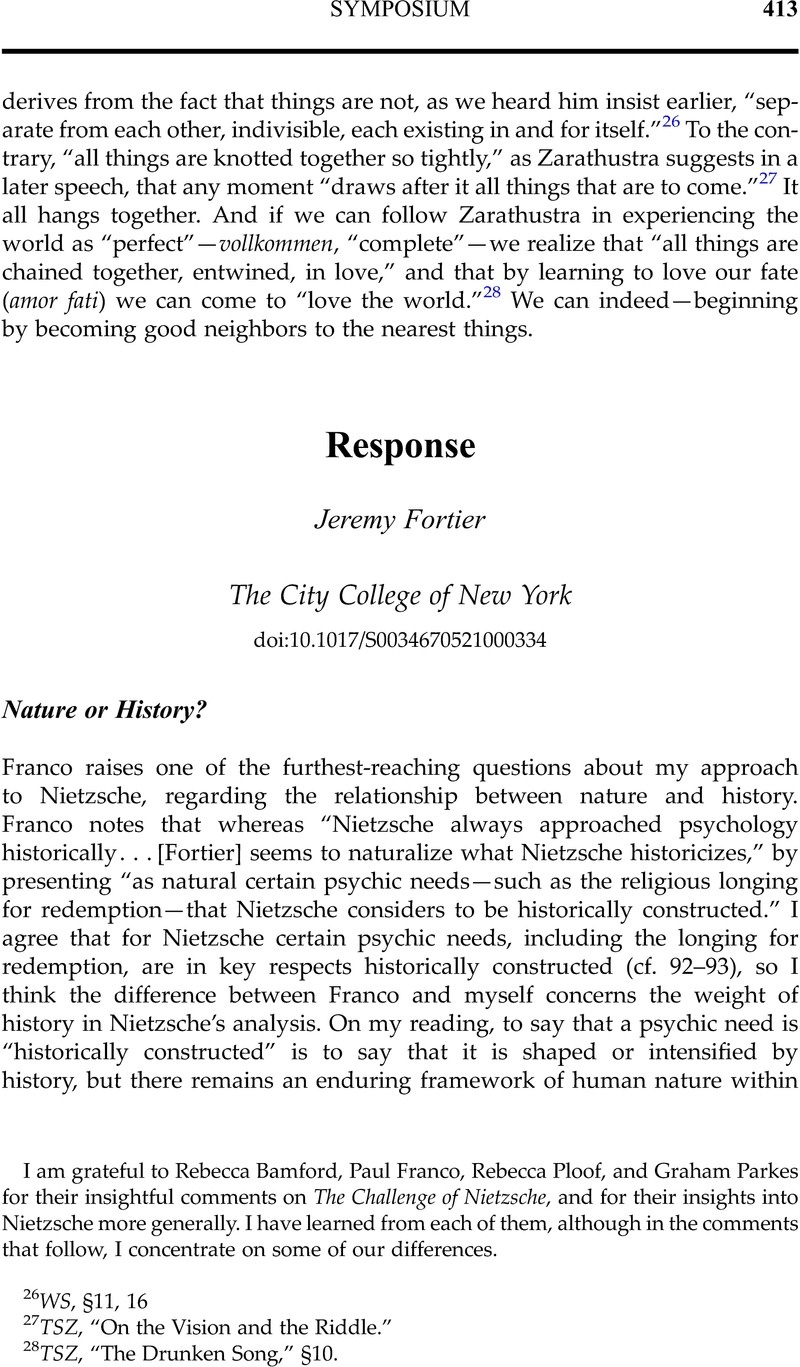No CrossRef data available.
Article contents
Response - Jeremy Fortier: The Challenge of Nietzsche: How to Approach His Thought (Chicago: University of Chicago Press, 2020. Pp. 256).
Review products
Published online by Cambridge University Press: 15 June 2021
Abstract

- Type
- A Symposium on Jeremy Fortier's The Challenge of Nietzsche: How to Approach His Thought
- Information
- Copyright
- Copyright © The Author(s), 2021. Published by Cambridge University Press on behalf of University of Notre Dame
References
29 See Nietzsche, Daybreak, §18, and consider the Foreword to Twilight of the Idols (where Nietzsche says that he aims to sound out “eternal idols”).
30 With regard to Nietzsche's genealogical method, this point has been made by Meredith, Thomas, “The Radical Goals of Slave Morality in Nietzsche's On the Genealogy of Morality,” Review of Politics 82, no. 2 (2020): 262–64CrossRefGoogle Scholar.
31 Nietzsche, The Wanderer and His Shadow, §86.
32 See Nietzsche, The Gay Science, §372, and consider the comparison suggested by Miner, Robert, Nietzsche and Montaigne (New York: Palgrave Macmillan), 276–77Google Scholar.
33 Brusotti, Marco, “Nietzsche and ‘Natural History’: Nietzsche's Beyond Good and Evil on the Free Spirit,” in Nietzsche's Metaphilosophy, ed. Loeb, Paul S. and Meyer, Matthew (Cambridge: Cambridge University Press), 9–10Google Scholar.
34 Meier, Heinrich, What Is Nietzsche's Zarathustra?, trans. Gottschalk, Justin (Chicago: University of Chicago Press, 2021)CrossRefGoogle Scholar and Meier, Nietzsches Vermächtnis (Munich: Beck, 2019).
35 Loeb, Paul, The Death of Nietzsche's Zarathustra (Cambridge: Cambridge University Press, 2010), 212–13CrossRefGoogle Scholar, and Loeb, “Ecce Superhomo: How Zarathustra Became What Nietzsche Was Not,” in Nietzsche's “Ecce Homo,” ed. Duncan Large and Nicholas Martin (Berlin: de Gruyter, 2020).
36 See Nietzsche, Beyond Good and Evil, §44, 211.
37 See Nietzsche, The Antichrist, §47.
38 Nietzsche, Beyond Good and Evil, §26; Thus Spoke Zarathustra, “On the Famous Wise Men.”
39 For additional discussion of this point, see Hough, Sheridan, Nietzsche's Noontide Friend (University Park: Pennsylvania State University Press, 1997), 97–100, 110, 138–42Google Scholar.
40 For Nietzsche on learning to love, see The Gay Science, §334 and Thus Spoke Zarathustra, “On the Spirit of Heaviness,” §2. For a compelling recent defense of Nehamas's reading of Nietzsche that complements Ploof's argument, see Anderson, R. Lanier and Cristy, Rachel, “What Is ‘the Meaning of Our Cheerfulness’? Philosophy as a Way of Life in Nietzsche and Montaigne,” European Journal of Philosophy 25, no. 4 (2017): 1514–49Google Scholar.
41 For a similar qualification of the reading of Nietzsche as a philosopher of self-fashioning, see Creasy, Kaitlyn, The Problem of Affective Nihilism in Nietzsche (New York: Palgrave Macmillan, 2020), 157CrossRefGoogle Scholar.
42 On self-affirmation as Nietzsche's primary value, see Richardson, John, Nietzsche's Values (New York: Oxford University Press, 2020), 358–60CrossRefGoogle Scholar.
43 On nature's indifference, see Beyond Good and Evil, §9; on Nietzsche's point of view, see Daybreak, §103.
44 Nietzsche, The Gay Science, §301; Beyond Good and Evil, §226.
45 Consider the outlook of Goethe and Hafiz as characterized in On the Genealogy of Morality III 2 and Nietzsche contra Wagner, “Wagner as an Apostle of Chastity,” §2.




